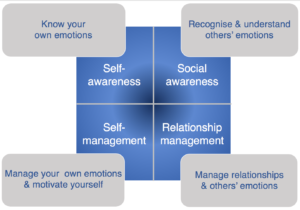31 Oct EQ, not IQ, makes a great leader
Emotional intelligence (EQ), not cognitive intelligence (IQ) differentiates good from great leaders.
Vision, toughness, intellectual smarts and determination are essential, but not sufficient, to be a great leader. Studies show that businesses that out-perform comparable others have leaders with all of these attributes and superior EQ.
This post explains while a high IQ and superior technical skills, like analysis, are important, EQ is the sine qua non of great leadership.
 As Daniel Goleman points out in his Harvard Business Review classic article, What Makes a Leader? (referenced below) we all know of very intelligent, highly motivated executives who fail when promoted into a senior leadership roles.
As Daniel Goleman points out in his Harvard Business Review classic article, What Makes a Leader? (referenced below) we all know of very intelligent, highly motivated executives who fail when promoted into a senior leadership roles.
And the opposite, someone with solid intellectual ability and professional skills who, on being promoted to a similar position, soars as a leader.
The one thing all effective leaders have in common is a high degree of EQ.
The four elements of EQ fall into two categories:
Managing self comprises Self-awareness and Self-management. Managing Self is the foundation of EQ; if you don’t know yourself, you can’t know others. Likewise you need to manage yourself before you can manage relationships with others.
Managing others comprises Social awareness (or empathy) and Management of relationships.
1. Self-awareness
Self-awareness is the ability to recognise and understand your own emotions, moods and inner drives and how they affect you and their impact on others. Getting in touch with your emotions means getting in touch with the bodily sensations they produce. Staying present, being mindful helps you tune into what your heart/gut is telling you.
People with a high degree of self-awareness know their strengths and weaknesses and are not afraid to disclose them to others. They make realistic assessments of themselves, are transparent, self-assured and can laugh at their foibles. They are willing to be vulnerable, are humble and authentic.
For example, a self-aware executive who is under pressure to deliver a project recognises and accepts the feelings the stress invokes. This enables them to share constructively how and why they are feeling with co-workers and paves the way for harmonious joint problem-solving and action.
2. Self-management
Self-management is built on self-awareness (or lack thereof). Those with superior self-regulating ability control their impulses. They know how to quiet intense, especially negative feelings, and provide perspective. For example, they know when to count to 10 before responding to an offensive comment. They channel, even re-direct, their disruptive impulses and moods. Unlike those who self-regulate poorly and go Fire–> Aim–> Ready, having high EQ means the person goes Ready? Aim–> Fire.
As a result, they project a calm, considered approach. They do not turn challenges into dramas and can be relied upon to respond consistently, thus winning trust. If frustrated or angry they know how to communicate these feelings constructively, so they are useful in initiating change. By not allowing themselves to be hijacked by their emotions they can think clearly and logically and therefore make sound decisions. Managing their own emotions translates into the way they direct their internal energy toward achieving a purpose. They can remain upbeat in the face of daunting challenges, strive to overcome obstacles and be motivated to succeed.
3. Social awareness or empathy
In addition to being very good at managing yourself, having a high EQ means you are ‘good with people’. This trait starts with being empathic, to genuinely feel what they are feeling, to be able to put yourself on the other person’s side to the desk or walk in their shoes.
It’s the ability to grasp the emotional make-up of others without judgement or blame. Being attuned to how others feel in the moment, a leader can say and do what is appropriate – whether it be to calm fears, assuage anger, or join in good spirits. The core skills include putting your own emotions to one side, acute observation of body language and deep listening.
4. Management of relationships
The triad of self-awareness, self-management and empathy all come together in the final EQ ability: relationship management. All of the above are conditions precedent to the ability to build rapport with others, to get them to co-operate willingly, and to move them in in the direction you desire.
Having these social skills is not only about being nice and friendly. In part exercising social skills is about being affable and approachable, but more importantly it is about building rapport. With rapport and earned trust you are able to influence. To change hearts and minds, help reshape beliefs, and focus effort towards a common purpose that serves the interests and needs both sides. Relationship management is not about coercing others to do as you say or to adopt your perspective. It is to take others on the journey because this is what they desire.
The good news: EQ can be learned
While science shows there is a genetic component (nature) to EQ, behavioural research convincingly demonstrates nurture plays a large role as well.
Bottom line? EQ can be learned. I am not saying it’s easy or quick to improve to improve your EQ. But the pay-off is handsome and rewarding for yourself and those around you.
Read more on this topic
- What makes a leader? Harvard Business Review by Daniel Goleman
- Other posts on leadership written by me on Letting Go. Stepping Up.
(1) A version of Managing Yourself: A Smarter Way to Network appeared in HBR, July–August 2011.


